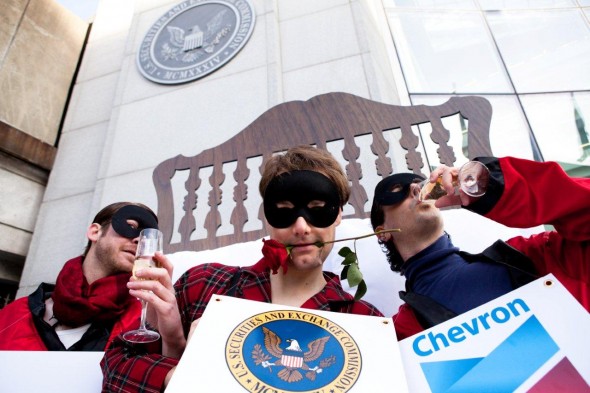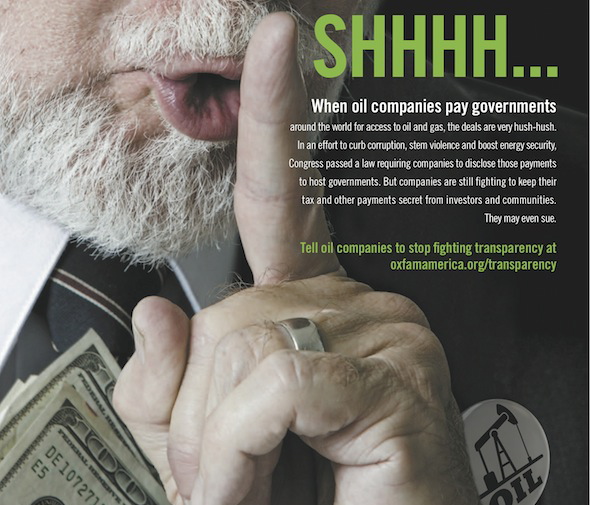Gloves are off!
There’s something deeply troubling about the notion that, with sufficient money for lawyers and lobbyists, corporations can pressure government officials to undo legislation. The bi-partisan Dodd-Frank financial reform laws were drafted, debated and approved in 2010. As I’ve written in a few recent posts, Section 1504 of this legislation requires oil and gas companies to disclose the amount of money they pay to governments in the countries where they operate (including the U.S.). The idea behind this law is simple: transparency can help those who are working for accountability.
The transparent hypocrisy of big oil

S.E.C. in bed with the oil companies? Oxfam event in front of S.E.C., February 10, 2012. Photo: Oxfam America
Ian Gary at Oxfam America has posted another excellent piece on the shameless hypocrisy of oil companies now pressuring the S.E.C. to water down parts of the 2010 Dodd-Frank financial reform legislation. (Read my blog post from yesterday for more background on this story.) Here’s the article cross-posted from Politics of Poverty:
The yawning gap between the transparency rhetoric of companies and the reality of their actions has never been more apparent than it is now.
The oil and gas industry loves to trumpet their support of international transparency initiatives and their tax contributions to the US government, but when a new law requires them to tell the public exactly how much gets paid to whom around the world, they bring out the lobbyists and lawyers.
Browse through the corporate social responsibility reports of the top oil and gas companies, and you’ll see them singing from the same transparency hymnbook. Chevron says it “believes that the disclosure of revenues received by governments and payments made by extractive industries to governments could lead to improved governance in resource-rich countries.”
2010 A New Year
Fragile existence. This is the story of life along the pipeline. Whatever happens to the global economy, the price of the barrel or ExxonMobil’s profits in 2010, life here will remain difficult. But the oil won’t stop flowing any time soon and as long as the pipeline is operational, there are opportunities for progress.
Peoples’ voices will be heard, their stories shared. Increased awareness, increased transparency, pressure from stockholders – these are all real possibilities that can lead to change. Oxfam has been actively involved in efforts to promote transparency in the extractive industries, for example, and recently launched a “Follow the Money” campaign. The Extractive Industries Transparency Initiative is moving forward.
Of course any change on the ground will be minimal at best, but let’s all work to make 2010 a year with a bit more social and environmental justice where it’s needed most.










